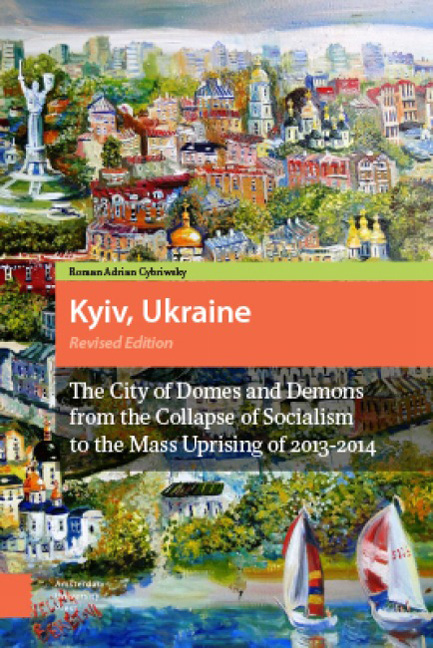 Kyiv, Ukraine
Kyiv, Ukraine Book contents
- Frontmatter
- Dedication
- Contents
- List of Illustrations and Tables
- A Note about Transliteration
- Preface and Acknowledgements
- 1 Far from Heaven
- 2 The Missing Museum of the History of the City of Kyiv
- 3 Sketches from the Capital
- 4 Soviet Ways, Post-Soviet Days
- 5 Historical Memory
- 6 The Center of Kyiv
- 7 A Geography of Privilege and Pretension
- 8 Landscapes of Struggle
- 9 “Suburbia”
- 10 Seamy Stories
- 11 The Defenders of Kyiv
- 12 Reflections
- Postscript
- References
- References
8 - Landscapes of Struggle
Published online by Cambridge University Press: 10 December 2020
- Frontmatter
- Dedication
- Contents
- List of Illustrations and Tables
- A Note about Transliteration
- Preface and Acknowledgements
- 1 Far from Heaven
- 2 The Missing Museum of the History of the City of Kyiv
- 3 Sketches from the Capital
- 4 Soviet Ways, Post-Soviet Days
- 5 Historical Memory
- 6 The Center of Kyiv
- 7 A Geography of Privilege and Pretension
- 8 Landscapes of Struggle
- 9 “Suburbia”
- 10 Seamy Stories
- 11 The Defenders of Kyiv
- 12 Reflections
- Postscript
- References
- References
Summary
The Killing of Oksana Makar
Oksana Makar lived a difficult life and, at age 18, died a horrible death. How she lived and how she died give insight to aspects of life among the poor in Ukraine, and perhaps also to special privileges enjoyed by the nonpoor. Put simply, this child of Ukrainian poverty and the social miseries that often accompany poverty had some questionable associations in her life, and in the end she was gang-raped by three young men and was then set afire and left to die. She survived for three weeks afterwards, but barely so, and then on March 29, 2012, succumbed to her horrible injuries. The next day she was buried in a wedding dress according to local tradition. The specific detail that these events took place not in Kyiv but about 480 kilometers (298 miles) away in the southern Ukrainian city of Mykolaiv is not very important for us; Oksana's story is a tragedy for all Ukraine, reflects the country as a whole, and may be a wake-up call in many respects about how to make the country better. I choose to tell this story also because it is very recent, and because Ukraine is talking about it, perhaps anxious to understand and learn.
Where to begin about Makar? Mykolaiv is a tough industrial city of about 500,000 known for shipbuilding and other heavy industry. It has not done well since the demise of the Soviet military machine that kept its factories busy and has offered its young citizens few prospects for a good life. Many of the most ambitious young people have left, either to go to Kyiv or other large Ukrainian cities, or just as often to seek work abroad. Others have fallen into poverty and some of the social problems such as alcohol and drug abuse that are often associated with economic hardship. The city's population has been declining in step with economic problems and outmigration. Oksana Makar was born into such a setting in 1993, two years after Ukraine's independence. She spent a lot of her childhood in an orphanage because her father was imprisoned for trafficking in narcotics and her mother for robbery. She completed only six years of schooling because she often ran away from the orphanage and was therefore not particularly employable as she approached adulthood.
- Type
- Chapter
- Information
- Kyiv, UkraineThe City of Domes and Demons from the Collapse of Socialism to the Mass Uprising of 2013–2014, pp. 215 - 252Publisher: Amsterdam University PressPrint publication year: 2014


